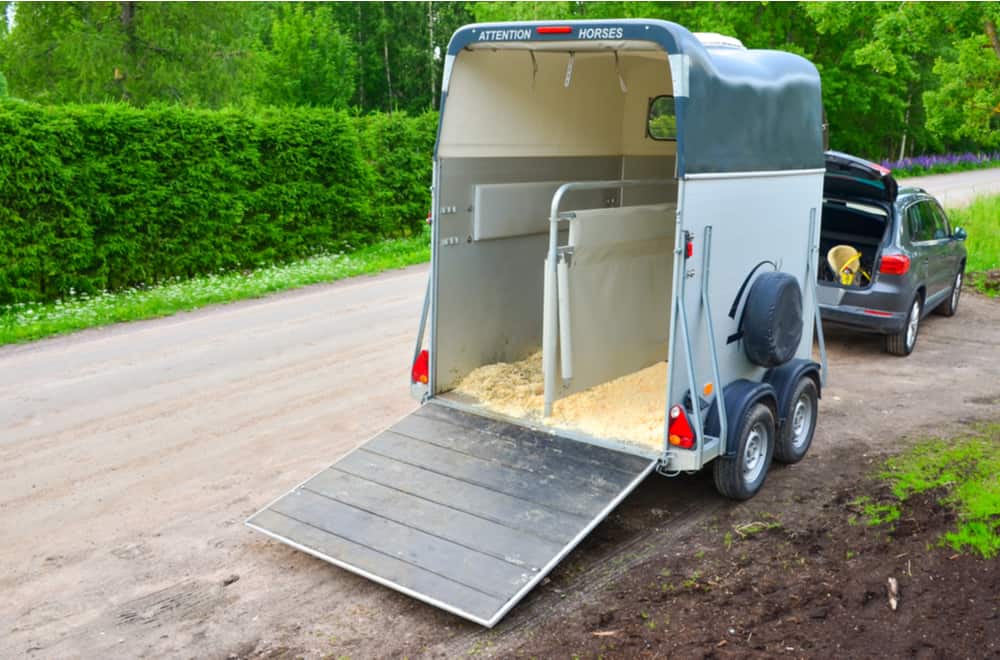Introduction
According to the United States Department of Agriculture, horse trailers can weigh anywhere from 3,500 pounds for a typical 3-horse trailer to 9,000 pounds for an 11-horse top-loader. Weight is an important factor to consider when picking out a horse trailer because it will determine not only the price but also performance and safety. The Max Cargo Wt column on the right side of the table lists the maximum weight capacity of each listed trailer.
Horses are amazing animals that can be used for many different purposes. They can serve as both a means of transportation and a pet. Horse trailers are used to transport horses from one place to another, and there are many different types of horse trailers that have been developed over the years. Stock trailers are usually specific to horses because they have the ability to contain food and water supplies for extended periods of time during travel, whereas other types like living quarters or loading ramps might not have this ability. Horse trailers range in weight from 3000 lbs to over 10000 lbs depending on their size and quality, so it is important that you know exactly what type of trailer you will need before purchasiis a vehicle that can be attached to another vehicle, using a hitch, and it has the purpose of transporting horses.
An empty aluminum trailer typically weighs between 1,000 and 4,500 pounds.
An empty aluminum trailer typically weighs between 1,000 and 4,500 pounds. A horse weighs approximately 1,200 pounds; if you put two horses in the trailer, it will weigh around 2,600 pounds. The heavier the weight of your load (i.e., how many things you’ve got in your trailer), the greater its total weight will be.
If you have three horses on board at once—a very common scenario for horse owners who often travel together—your vehicle’s total weight could easily exceed 6,500 pounds!
Horse Trailers Weight

0 seconds of 15 secondsVolume 0%
Choosing a horse trailer is not easy. You need to think and reconcile three things to be satisfied with your choice in the end.
| Trailer Weight By A Type | ||||
| Trailer type | Average empty weight | Empty weight range in pounds | GVWR in pounds | Average load capacity |
| Canoe/kayak trailer | 200 pounds(91 kg) | 100 to 400(45 – 181kg) | 200 to 800(91 – 363 kg) | 200 pounds(91 kg) |
| Jet ski trailer | 300 pounds(136 kg) | 100 to 500(45 – 227 kg) | 800 to 3,000(363 – 1,361 kg) | 1,500 pounds(680 kg) |
| Motorcycle trailer | 500 pounds(227 kg) | 300 to 800(136 – 363 kg) | 1,300 to 3,500(590 – 1,588 kg) | 1,900 pounds(862 kg) |
| Fishing boattrailer | 600 pounds(272 kg) | 200 to 1,100(91 – 499 kg) | 900 to 6,000(408 – 2,722 kg) | 2,700 pounds(1,225 kg) |
| Tow dolly | 600 pounds(272 kg) | 400 to 800(181 – 363 kg) | 3,000 to 5,000(1,361 – 2,268 kg) | 3,400 pounds(1,542 kg) |
| Small open utility trailer | 700 pounds(318 kg) | 300 to 1,100(136 – 499 kg) | 1,000 to 3,000(454 – 1361 kg) | 1,800 pounds(816 kg) |
| Small enclosed utility trailer | 1,000 pounds(454 kg) | 400 to 1,800(181 – 816 kg) | 2,000 to 7,000(907 – 3,175 kg) | 2,200 pounds(998 kg) |
| Teardrops trailer | 1,700 pounds(771 kg) | 500 to 3,200(227 – 1,451 kg) | 2,000 to 4,000(907 – 1,814 kg) | 700 pounds(318 kg) |
| A-frame camper | 1,700 pounds(771 kg) | 1,200 to 2,300(544 – 1,043 kg) | 2,500 to 3,600(1,134 – 1,633 kg) | 1,200 pounds(544 kg) |
| Car trailer | 1,900 pounds(862 kg) | 1,500 to 2,800(680 – 1,270 kg) | 6,000 to 15,000(2,722 – 6,804 kg) | 7,100 pounds(3,221 kg) |
| Large boat trailer | 2,200 pounds(998 kg) | 1,100 to 4,400(500 – 2,000) | 5,400 to 34,400(2,449 – 15,604 kg) | 11,400 pounds(5,181 kg) |
| Pop up camper | 2,300 pounds(1,043 kg) | 1,400 to 3,000(635 – 1,360 kg) | 2,700 to 4,000(1,225 – 1,814 kg) | 1,100 pounds(500 kg) |
| Large enclosed utility trailer | 2,700 pounds(1,225 kg) | 900 to 5,200(408 – 2,359 kg) | 3,000 to 10,000(1,361 – 4,536 kg) | 4,400 pounds(2,000 kg) |
| Small travel trailer | 2,800 pounds(1,270 kg) | 1,200 to 3,900(544 – 1,769 kg) | 1,900 to 4,500(862 – 2,041 kg) | 800 pounds(363 kg) |
| Small horse trailer | 2,900 pounds(1,315 kg) | 2,300 to 3,900(1,043 – 1,769 kg) | 7,000 to 8,000(3,175 – 3,629 kg) | 4,300 pounds(1,950 kg) |
| Large flatbed trailer | 3,000 pounds(1,361 kg) | 500 to 7,700(227 – 3,493 kg) | 2,900 to 26,000(1,315 – 11,793 kg) | 7,400 pounds(3,357 kg) |
| Dump trailer | 4,500 pounds(2,041 kg) | 1,100 to 10,100 (499 – 4,580) | 3,000 to 30,000 (1,361 – 13,608 kg) | 12,400 pounds(5,625 kg) |
| Large travel trailer | 6,700 pounds(3,039 kg) | 4,500 to 8,700 (2,041 – 3,946 kg) | 6,300 to 10,500 (2,858 – 4,763 kg) | 1,600 pounds(726 kg) |
| Gooseneck flatbed trailer | 7,200 pounds(3,266 kg) | 4,700 to 10,400 (2,132 – 4,717 kg) | 15,900 to 36,000 (7,212 – 16,329 kg) | 16,000 pounds(7,258 kg) |
| Large livestock trailer | 7,300 pounds(3,311 kg) | 4,200 to 10,900 (1,905 – 4,944 kg) | 14,000 to 24,000 (6,350 – 10,886 kg) | 11,400 pounds(5,171 kg) |
| Toy hauler | 7,600 pounds(3,447 kg) | 3,600 to 11,400 (1,633 – 5,171 kg) | 14,700 to 22,500 (6,668 – 10,206 kg) | 10,300 pounds(4,672 kg) |
| 5th wheel camper | 12,700 pounds(5,761 kg) | 5,000 to 16,000 (2,268 – 7,257 kg) | 17,000 to 20,000 (7,711 – 9,072 kg) | 6,000 pounds(2,722 kg) |
The first thing to do is look over your horse and estimate its size and weight. That way, you won’t invest money in buying an inadequate trailer and towing vehicle.
Then, it is time to pick out a trailer and towing vehicle that best suit your needs. There is one more vital thing. It is recommended to learn the terminology manufacturers and sellers often use, including:
- DOT – It is an abbreviation for the Ministry of Transport, which issues the necessary permits for use.
- Curb weight – It indicates the empty trailer weight with ancillary equipment like floor mats and a spare tire.
- CGVWR – Combined gross vehicle weight rating is the maximum permissible weight of a loaded trailer and towing vehicle specified by the manufacturer.
- Ball mount – It is a mount with a ball, tow hook, and a mounted frame.
- GVW – This term indicates a fully loaded trailer, including horses, spare tire, water tank, mats, and hay you plan to transport.
- GAWR – Gross axle weight rating determines how much weight the trailer axle can carry.
- GVWR – Gross vehicle weight rating is crucially for transport safety. It is a vehicle and trailer weight limit specified by the manufacturer. It includes the weight of cargo, complete equipment, and animals you transport.
- Tow capacity – This term refers to the safe weight for the towing vehicle specified by the manufacturer.
Horse Trailer Types

The standard trailer type is usually intended for two horses, but you can find models for three, four, and more animals. The average horse trailer weighs about 3,500 to 4,000 pounds (1,6 – 1,8 kg).
Bumper Pulls Trailer
This trailers type is suitable for horse owners who transport one or two horses, although you can use it for three smaller animals when necessary. Because of their convenient design, most SUVs and trucks can tow them.
| Bumper Pulls Trailer Weight | |
| Trailer model | Curb weight |
| For one horse | 2,700 to 2,780lbs (1,225 – 1,261 kg) |
| For two horses | 2,435 to 4,020lbs (1,104 – 1,823 kg) |
| For three horses | 2,850 to 3,960lbs (1,293 – 1,796 kg) |
Bumper pull trailers don’t need a hook system because they have a standard turn radius. It is a good choice if it is your first trailer. Its weight varies depending on the manufacturer and model you choose.
Gooseneck Trailer
Goosenecks trailers are more sizable than bumper pull trailers and can withstand heavier weights. Plus, this model is stable and convenient to maneuver, and its design allows attaching to the truck towbar.
| Gooseneck Trailer Weight | |
| Trailer model | Curb weight |
| For one horse | 2,850 pounds (1,293 kg) |
| For two horses | 3,285 to 4,700 pounds (1,490 – 2,132 kg) |
| For three horses | 3,960 to 5,675 pounds (1,293 – 2,574 kg) |
| For four horses | 4,220 to 8,400 pounds (1,914 – 3,810 kg) |
| Bigger horse trailer | 4,940 to 6,650 pounds (2,241 – 3,016 kg) |
Keep in mind that untrained turning can damage the bumper and surrounding objects. It is also necessary to install towing hooks on trucks because they are not standard equipment for this vehicle type.
Stock Trailer
Stock trailers resemble large open boxes and most often have no internal bulkheads. This basic trailer design has no extra space, except for small storage for equipment.
| Stock Trailer Weight | |
| Model | Curb weight |
| Stock trailer | 2,200 to 5,300 pounds (998 – 2,445 kg) |
These vehicles are durable and exceptionally reliable, with open sides that allow more air to pass inside. Unfortunately, these trailers are not suitable for high horses because they are primarily used for cattle transport.
Horse Box
This practical trailer model is rare in the US. It combines a towing vehicle and a horse trailer that form one whole.
Trailer With Living Space
This trailer type has an additional living space for the owner or trainer. Surprisingly, this accommodation is comfortable and includes a bathroom, kitchen, small living room, and bed. The vehicle is practical for breeders who show their horses at shows.
You can also use this convenient model to transport a sick or injured horse to keep it under constant vet supervision during transport. The space for the horse includes a wooden floor, safety carriers with traction, and lashing rails.
Horse Trailers Material

Steel
Steel trailers are popular, and people often choose this material since it is durable and rarely breaks. This metal’s primary disadvantage is its tendency to rust, but today manufacturers solve this by using galvanized steel.
Since steel is heavy, a trailer made of steel will also have a weight problem. Despite these disadvantages, steel trailers are long-lasting. Some have been in use for over 20 years.
Aluminum
Aluminum trailers have emerged in the search to find a lighter material that won’t rust. However, this metal has a few drawbacks, including:
- It is more expensive than steel
- It is not as strong as steel, so the trailer’s wall needs to be three times thicker
- Aluminum is brittle and its welding is complicated, so it probably won’t last for a long
- This metal is a good conductor of heat, making the trailer inadequate for transporting horses during hot and cold days
Conclusion
You can calculate the weight of a horse trailer by adding up all the weights of the various components. The heaviest component is usually a metal frame followed by tires and axles. The total weight typically ranges from 3000 pounds (1350 kg) to over 10000 pounds (4535 kg)!